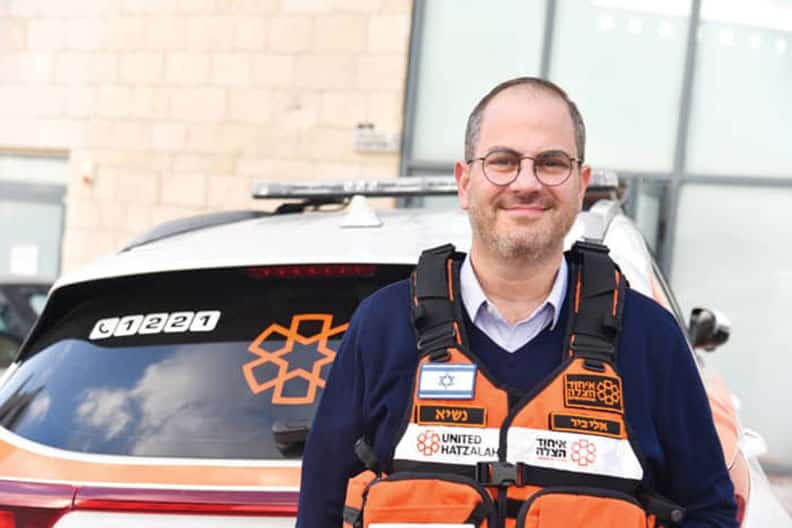
I remember meeting Eli Beer four years ago in Los Angeles, a few days before he hosted a Gala for Friends of United Hatzalah of Israel. We were at a private gathering, and Beer exuded good health and vitality, giving everyone big hugs.
Who knew that a few weeks later, in Miami, Beer would become gravely ill with Covid-19 and be bracing himself for a second induced coma and intubation in an intensive care unit. He was thousands of miles from his wife, Gitty, and their five children in Jerusalem.
“I was very afraid that if they put me to sleep I won’t wake up,” Beer said at the time.
After a harrowing month with his life hanging in the balance, Beer eventually did wake up. He recovered enough of his strength to return to his life’s work—running an organization whose core mission is to save as many lives as possible.
Now, four years later, I’m having coffee with Beer at The Beverly Hills Hotel and I see a changed man. The massacres of October 7 have shaken him, but that’s not all. His miraculous recovery from Covid has also changed him.
He talks about how despondent he felt when the virus invaded his body. As he said at the time: “I said goodbye to Gitty. I didn’t know if this was the end. I told my children not to worry, that I would come home, but in my heart I knew my chances of making it were very low.”
And of course, he talks about October 7, about how hard Israel fell on that horrific day when more than a thousand murderers invaded Israel.
While Beer still has that spark of enthusiasm, one senses that he has mellowed, that life has humbled him. He’s been humbled by both his own brush with death and by the calamity of October 7. In a way, Beer embodies the new Israel post-October 7: Sobered by a traumatic event but grateful to be alive and ferociously determined to come out ahead.
Such determination has defined Beer since he was a teenager. At the time, in 1989, Beer saw that ambulances often had trouble reaching emergency scenes in heavy Jerusalem traffic. So he recruited neighborhood-based volunteer medics to begin first aid until the ambulance arrives.
That became the inspiration for the United Hatzalah nonprofit he founded that is now the largest independent, fully volunteer emergency medical service in Israel. Its services are free and available to all people regardless of race, religion or national origin.
But what makes them stand out is speed. Over the years, technology has driven Hatzalah’s ability to improve response times. With its GPS technology and ambucycles, it has lowered the average response time to less than 3 minutes across Israel and 90 seconds in many metropolitan areas.
With this urgency comes a need for calm. Beer himself talks with an inner calm, which fits his work. Indeed, the very mission of emergency responders calls for the opposite of panic, for a fanatical obsession with saving a life. Emotions are a luxury.
But Beer is overcome with emotion when he talks about October 7 and his organization’s response to that darkest of days. As if to seek support, he hands me a new book titled, “Angels in Orange: Uplifting Stories of Courage, Faith and Miracles from the United Hatzalah Heroes of October 7th,” by Rabbi Nachman Seltzer.
An overview of the book by Rabbi Nosson Scherman captures both the horror and the heroes:
“When inhuman murderers burst into Eretz Yisrael with their guns blazing, determined to kill, maim, torture and kidnap, thousands of unarmed and defenseless Jews were forced to flee for their lives, with more than 1200 falling victim to butchers masquerading as humans.
“One thousand seven hundred civilians ran as well. They ran from the safety of Jerusalem, Tel Aviv, Modi’in and Bnei Brak, racing to the south, to the danger, not to take lives but to save them. They were the ‘angels in orange,’ the volunteers of Hatzalah.”
Eli Beer is one of those angels. On March 20, Beer will be hosting another gala in Los Angeles, this one titled “An Evening of Unity for Israel.”
His life, and his long experience with saving lives and confronting his own mortality, has prepared him for this moment.























 More news and opinions than at a Shabbat dinner, right in your inbox.
More news and opinions than at a Shabbat dinner, right in your inbox.